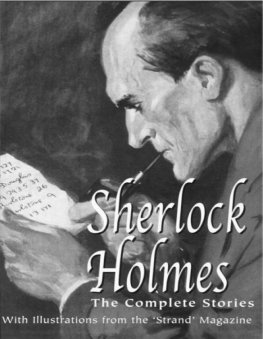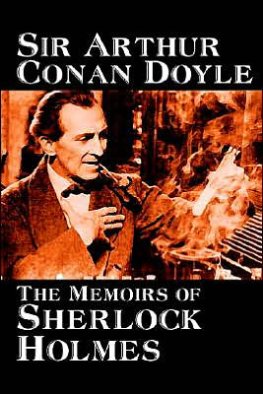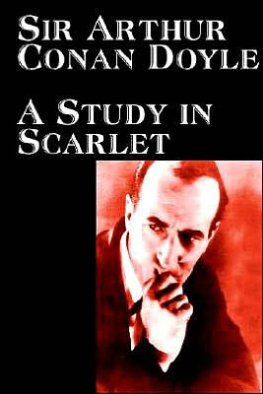Sir Arthur Conan Doyle
The Adventure of the Speckled Band
On glancing over my notes of the seventy odd cases in which I have during the last eight years studied the methods of my friend Sherlock Holmes, I find many tragic, some comic, a large number merely strange, but none commonplace; for, working as he did rather for the love of his art than for the acquirement of wealth, he refused to associate himself with any investigation which did not tend towards the unusual, and even the fantastic. Of all these varied cases, however, I cannot recall any which presented more singular features than that which was associated with the well-known Surrey family of the Roylotts of Stoke Moran. The events in question occurred in the early days of my association with Holmes, when we were sharing rooms as bachelors in Baker Street. It is possible that I might have placed them upon record before, but a promise of secrecy was made at the time, from which I have only been freed during the last month by the untimely death of the lady to whom the pledge was given. It is perhaps as well that the facts should now come to light, for I have reasons to know that there are widespread rumours as to the death of Dr. Grimesby Roylott which tend to make the matter even more terrible than the truth.
It was early in April in the year 83 that I woke one morning to find Sherlock Holmes standing, fully dressed, by the side of my bed. He was a late riser, as a rule, and as the clock on the mantelpiece showed me that it was only a quarter-past seven, I blinked up at him in some surprise, and perhaps just a little resentment, for I was myself regular in my habits.
Very sorry to knock you up, Watson, said he, but its the common lot this morning. Mrs. Hudson has been knocked up, she retorted upon me, and I on you.
What is it, then a fire?
No; a client. It seems that a young lady has arrived in a considerable state of excitement, who insists upon seeing me. She is waiting now in the sitting-room. Now, when young ladies wander about the metropolis at this hour of the morning, and knock sleepy people up out of their beds, I presume that it is something very pressing which they have to communicate. Should it prove to be an interesting case, you would, I am sure, wish to follow it from the outset. I thought, at any rate, that I should call you and give you the chance.
My dear fellow, I would not miss it for anything.
I had no keener pleasure than in following Holmes in his professional investigations, and in admiring the rapid deductions, as swift as intuitions, and yet always founded on a logical basis with which he unravelled the problems which were submitted to him. I rapidly threw on my clothes and was ready in a few minutes to accompany my friend down to the sitting-room. A lady dressed in black and heavily veiled, who had been sitting in the window, rose as we entered.
Good-morning, madam, said Holmes cheerily. My name is Sherlock Holmes. This is my intimate friend and associate, Dr. Watson, before whom you can speak as freely as before myself. Ha! I am glad to see that Mrs. Hudson has had the good sense to light the fire. Pray draw up to it, and I shall order you a cup of hot coffee, for I observe that you are shivering.
It is not cold which makes me shiver, said the woman in a low voice, changing her seat as requested.
What, then?
It is fear, Mr. Holmes. It is terror. She raised her veil as she spoke, and we could see that she was indeed in a pitiable state of agitation, her face all drawn and gray, with restless frightened eyes, like those of some hunted animal. Her features and figure were those of a woman of thirty, but her hair was shot with premature gray, and her expression was weary and haggard. Sherlock Holmes ran her over with one of his quick, all-comprehensive glances.
You must not fear, said he soothingly, bending forward and patting her forearm. We shall soon set matters right, I have no doubt. You have come in by train this morning, I see.
You know me, then?
No, but I observe the second half of a return ticket in the palm of your left glove. You must have started early, and yet you had a good drive in a dog-cart, along heavy roads, before you reached the station.
The lady gave a violent start and stared in bewilderment at my companion.
There is no mystery, my dear madam, said he, smiling. The left arm of your jacket is spattered with mud in no less than seven places. The marks are perfectly fresh. There is no vehicle save a dog-cart which throws up mud in that way, and then only when you sit on the left-hand side of the driver.
Whatever your reasons may be, you are perfectly correct, said she. I started from home before six, reached Leatherhead at twenty past, and came in by the first train to Waterloo. Sir, I can stand this strain no longer; I shall go mad if it continues. I have no one to turn to none, save only one, who cares for me, and he, poor fellow, can be of little aid. I have heard of you, Mr. Holmes; I have heard of you from Mrs. Farintosh, whom you helped in the hour of her sore need. It was from her that I had your address. Oh, sir, do you not think that you could help me, too, and at least throw a little light through the dense darkness which surrounds me? At present it is out of my power to reward you for your services, but in a month or six weeks I shall be married, with the control of my own income, and then at least you shall not find me ungrateful.
Holmes turned to his desk and, unlocking it, drew out a small case-book, which he consulted.
Farintosh, said he. Ah yes, I recall the case; it was concerned with an opal tiara. I think it was before your time, Watson. I can only say, madam, that I shall be happy to devote the same care to your case as I did to that of your friend. As to reward, my profession is its own reward; but you are at liberty to defray whatever expenses I may be put to, at the time which suits you best. And now I beg that you will lay before us everything that may help us in forming an opinion upon the matter.
Alas! replied our visitor, the very horror of my situation lies in the fact that my fears are so vague, and my suspicions depend so entirely upon small points, which might seem trivial to another, that even he to whom of all others I have a right to look for help and advice looks upon all that I tell him about it as the fancies of a nervous woman. He does not say so, but I can read it from his soothing answers and averted eyes. But I have heard, Mr. Holmes, that you can see deeply into the manifold wickedness of the human heart. You may advise me how to walk amid the dangers which encompass me.
I am all attention, madam.
My name is Helen Stoner, and I am living with my stepfather, who is the last survivor of one of the oldest Saxon families in England, the Roylotts of Stoke Moran, on the western border of Surrey.
Holmes nodded his head. The name is familiar to me, said he.
The family was at one time among the richest in England, and the estates extended over the borders into Berkshire in the north, and Hampshire in the west. In the last century, however, four successive heirs were of a dissolute and wasteful disposition, and the family ruin was eventually completed by a gambler in the days of the Regency. Nothing was left save a few acres of ground, and the two-hundred-year-old house, which is itself crushed under a heavy mortgage. The last squire dragged out his existence there, living the horrible life of an aristocratic pauper; but his only son, my stepfather, seeing that he must adapt himself to the new conditions, obtained an advance from a relative, which enabled him to take a medical degree and went out to Calcutta, where, by his professional skill and his force of character, he established a large practice. In a fit of anger, however, caused by some robberies which had been perpetrated in the house, he beat his native butler to death and narrowly escaped a capital sentence. As it was, he suffered a long term of imprisonment and afterwards returned to England a morose and disappointed man.

















